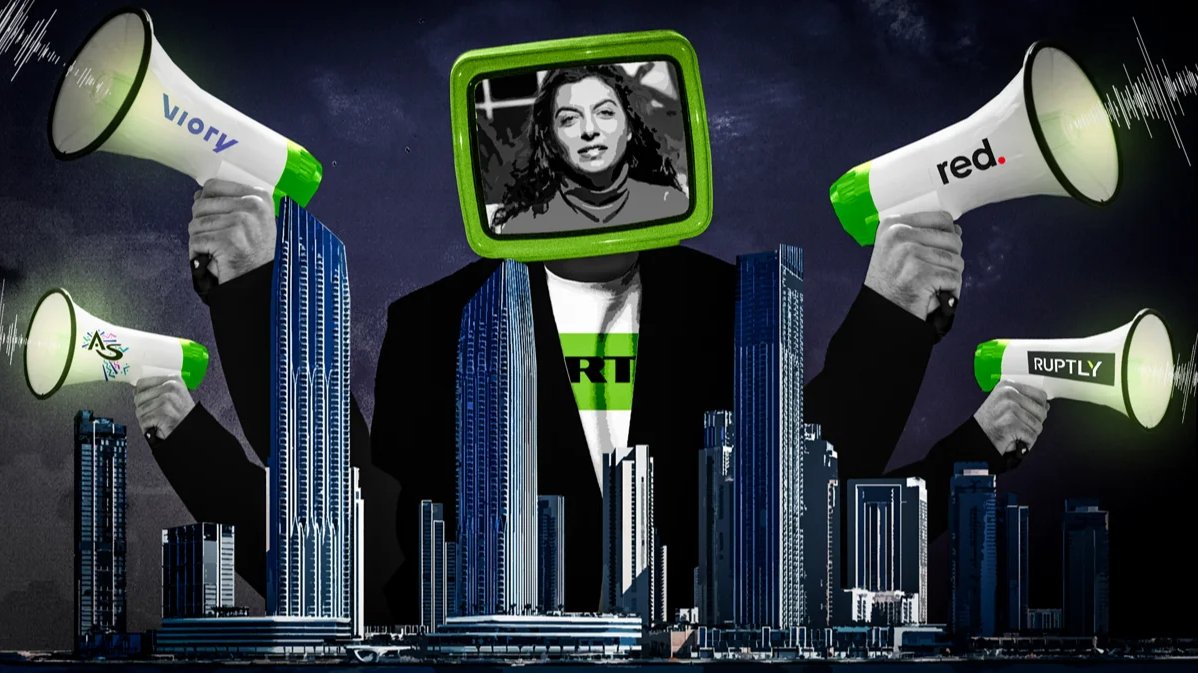After Russia invaded Ukraine in 2022, the state television channel RT — formerly Russia Today — was sanctioned by the United States, the United Kingdom, and the European Union. Major distributors around the world dropped the channel, and its social media accounts were suspended. Many RT employees were laid off and forced to leave Western countries. So how is it that, three years later, the Kremlin’s chief mouthpiece is still broadcasting its message to the world? The United Arab Emirates (UAE), which now serves as RT’s financial and organisational hub of operations, has allowed the organisation to continue disseminating Russian propaganda to Western audiences. In a new investigation, Novaya Gazeta Europe has uncovered a clandestine network of projects and efforts aimed at circumventing sanctions.
Going underground: from London to the Gulf
The political news show Going Underground, hosted by British journalist Afshin Rattansi, was once RT’s flagship programme in the United Kingdom. Its motto: “We ask the questions that the mainstream media avoids.” Going Underground frequently aired controversial interviews: a sit-down with Syrian dictator Bashar al-Assad, multiple segments featuring the American journalist Seymour Hersh, whose public musings on topics such as the use of Novichok in the poisoning of Sergey and Yulia Skripal have been widely criticised.
The UAE was implicated in charges of money laundering and violations of the Foreign Agents Registration Act brought against two RT employees by the US Department of Justice.
Going Underground originally aired on cable and evolved into an independent YouTube channel as well, with 165,000 subscribers and 32 million views. It faced an abrupt end in 2022, after the European Union ordered a total ban on Russian state broadcasters, describing RT and affiliate Sputnik as tools of destabilisation and instruments of aggression against Ukraine. The UK swiftly followed suit, revoking RT’s licence, while major social media platforms like YouTube removed its accounts. Going Underground managed to retain a presence on X, formerly Twitter, where it still boasts over 150,000 followers.
These setbacks did not deter Rattansi. Novaya Gazeta Europe can report that Rattansi soon relocated to Dubai, where he resumed production of Going Underground on Rumble, a Canadian platform that is particularly popular among right-wing commentators because of its lax content moderation.
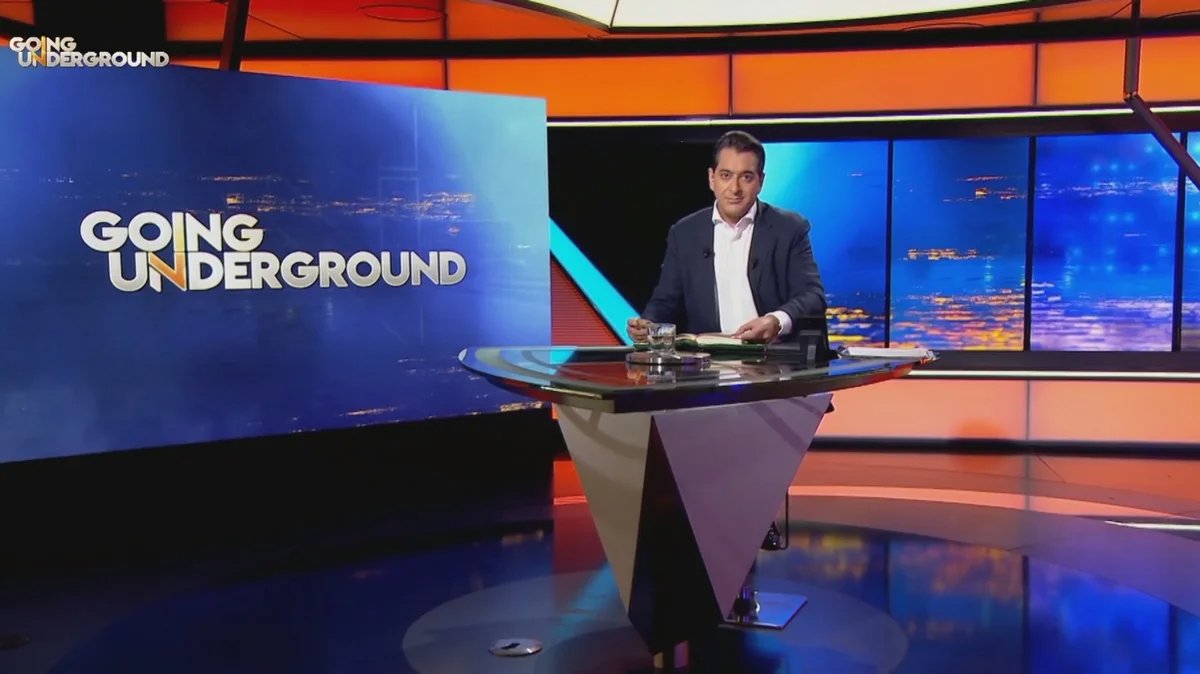
Afshin Rattansi, still from Going Underground / Rumble
On his LinkedIn profile, Rattansi now lists his employer as Ghaf TV. Other former RT UK employees — Maria Tokmakova, Yekaterina Chekushkina, and Farhan Ahmed — have apparently also joined Ghaf TV. Attempts by Novaya Gazeta Europe to reach Rattansi and his colleagues went unanswered.
Editorially the show is the same. Rattansi continues to echo the Kremlin’s talking points, as he did when commenting on the Trump administration’s closure of USAID, declaring: “USAID paved the road to hell worldwide… In Ukraine, USAID used its funds during the 2014 Maidan coup to install Washington’s puppet regime, ultimately leading to the Russia-NATO proxy war.” Recent episodes bore headlines like Europe Prepares for Direct War with Russia — But Why?, Britain’s Proxy War Policy in Ukraine Is a Catastrophe, and Russia’s Victory in Ukraine Looms.
Ghaf TV now produces another programme now too — Forecast News — in which Rattansi and co-host Millie Pinch offer weekly news analyses.
A broader network: Russian media’s quiet migration to the Gulf
Ghaf TV’s operations are not an isolated case. Numerous RT-affiliated projects have re-emerged in the UAE under new guises. Since the full-scale invasion began, the UAE’s stance of neutrality has turned it into a safe harbour for Russians looking to avoid sanctions, and sometimes a literal harbour for oligarchs’ mega-yachts. It has likewise become a critical centre for RT’s financial and logistical activities, funded by Russian taxpayers to the tune of tens of millions of dollars.
Last September the UAE was implicated in charges of money laundering and violations of the Foreign Agents Registration Act brought against two RT employees by the US Department of Justice. The employees, Konstantin Kalashnikov and Yelena Afanasyeva, had allegedly funnelled $10 million through shell companies to Tenet Media — a US platform that spread pro-Russian narratives ahead of the 2024 presidential elections.
According to court documents, Tenet Media’s funding came from at least two UAE-based companies. One of these companies, Sonorous Technologies, has links to Denis Khudiev, a former Ukrainian regional politician with ties to the pro-Russian Party of Regions. Khudiev did not respond to inquiries from Novaya Gazeta Europe.
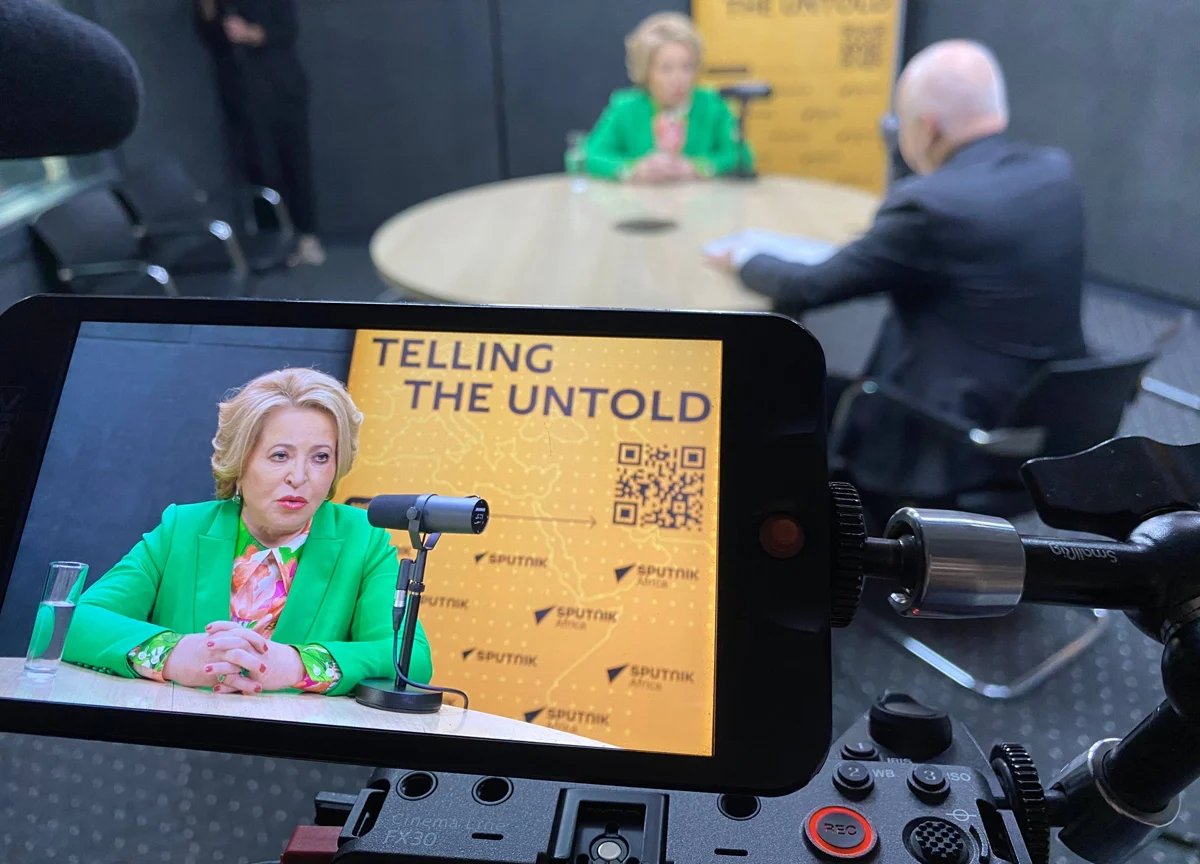
Valentina Matviyenko in the Sputnik studio in Addis Ababa, Ethiopia, 19 February 2025. Photo: Sputnik / Imago Images / Scanpix / LETA
Sputnik radio and the Monolink сonnection
While Europe acted quickly, the US Treasury Department waited to levy tough sanctions against RT until September. Sputnik radio broadcasts continued unabated in Washington for years after the full-scale invasion and well into the 2024 Presidential election.
Sputnik exploited narratives from across the political spectrum: hosting guests who said that Israeli Prime Minister Benjamin Netanyahu was leading Israel and the West towards “catastrophic collapse,” bemoaning NATO’s desperate position and accusing the Biden administration of media censorship.
Company records show that Sputnik’s US broadcast rights were paid for by the Monolink Group FZCO, a Dubai-based company with circuitous ties to the Russian Defence Ministry through the Novakhov family. Monolink lists Samuel (Stanislav) Novakhov as a contact on company records; Novakhov has been sanctioned by the UK.
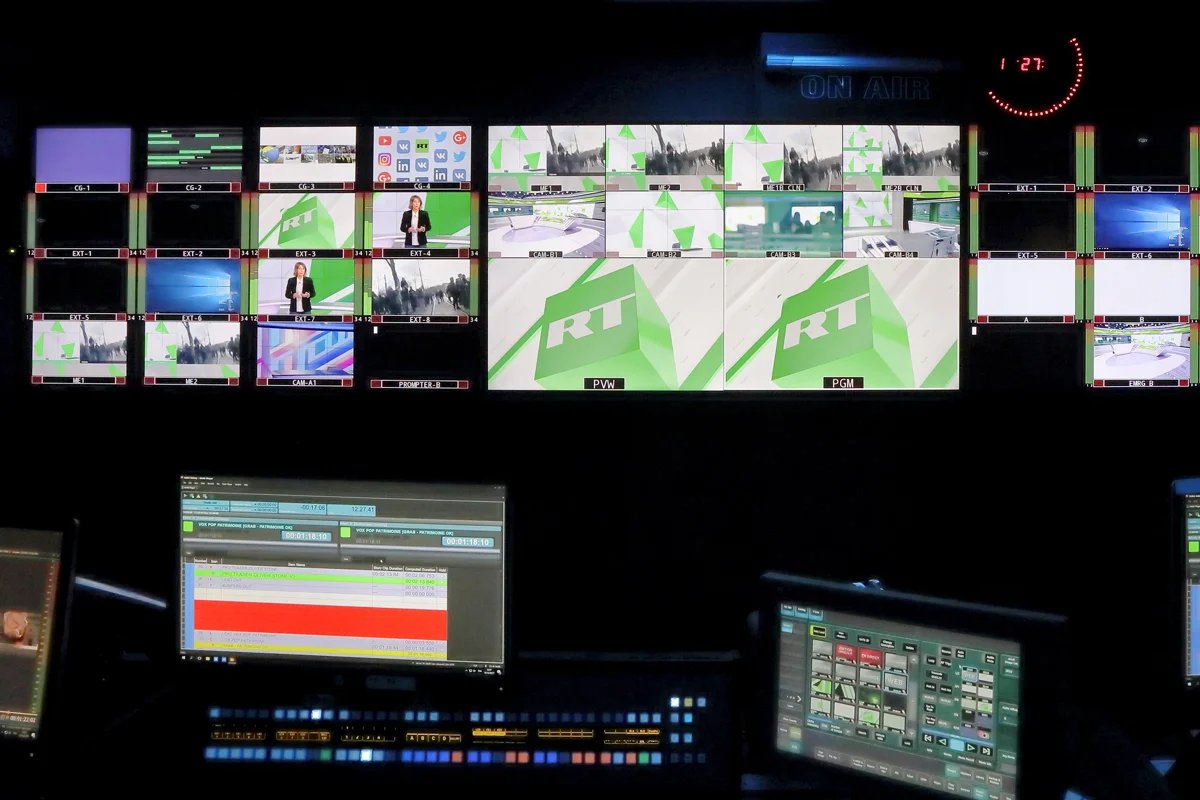
RT news studio near Paris, France, 18 December 2017. Photo: Gonzalo Fuentes / Reuters / Scanpix / LETA
Ruptly reborn: from Berlin to Abu Dhabi
Another RT subsidiary that was formerly headquartered in Germany — the video news agency Ruptly — has also found refuge in the Emirates. Before the war, Ruptly’s footage was frequently used by reputable media outlets, including The Guardian and The Independent, despite criticisms that using this footage was a way of spreading disinformation.
During the 2020 Black Lives Matter protests in the U.S., NBC News reported that Ruptly was one of several Russia-funded sites that had edited footage to exaggerate conflict between demonstrators and police. In 2017, Ruptly was revealed to have fabricated the story that a New York restaurant created a burger in honour of Vladimir Putin’s birthday.
Following EU sanctions, Ruptly’s German entity is being liquidated. But its former director Dinara Toktosunova appears to be part of a new venture called Viory, which is registered in Abu Dhabi. Viory’s website offers video footage, including material on the “Russia-Ukraine conflict”, and conspicuously avoids using the word war.
Unlike Ruptly, Viory operates only in English and Arabic, suggesting a reduced or perhaps more targeted global audience.
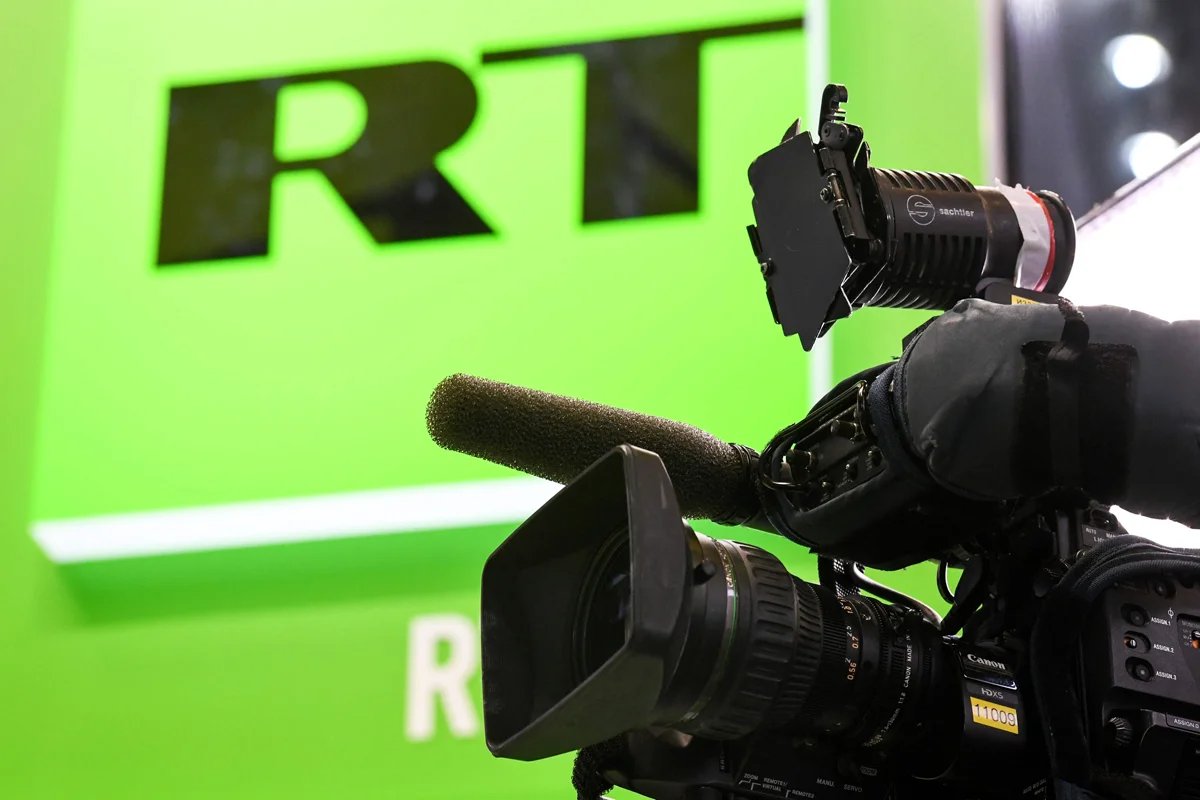
RT at the St. Petersburg International Economic Forum, 24 May 2018. Photo: Kirill Kudryashov / AFP / Scanpix / LETA
The new face of propaganda
“Russia’s propaganda machine keeps working and probably cannot be stopped by the EU,” Toktosunova said a few months before the full-scale invasion began.
She seems to have been proved right. Gregory Asmolov, a specialist in digital humanities at King’s College London, said that Russian propaganda has proven remarkably adaptable. “When structures like RT lose access to traditional broadcasting channels, they adapt — creating new platforms, fake sites, independent-looking media, and leveraging influencers with no visible ties to the Russian state,” Asmolov said.
Technologies like generative AI, anonymous messaging apps, and social media micro-targeting have made tracing and blocking such campaigns vastly more difficult. The terrain is so treacherous that, last September, when he was introducing the new sanctions on Russian state-media, Antony Blinken, then secretary of state, described its activities as “guerrilla information warfare”.
“Propaganda no longer needs a big channel with a recognisable logo.”
One RT-controlled project called African Stream targeted audiences in Africa with pro-Russian narratives. In Germany RT covertly operated an English-language platform called Red to exploit anti-colonial sentiments and reportedly to help organise protests.
“Propaganda no longer needs a big channel with a recognisable logo,” Asmolov said. “Today, it spreads through decentralised networks embedded in the global digital ecosystem.”
He says that combating these influence campaigns requires not only regulation, but also fostering an information environment conducive to high-quality journalism that is accessible to diverse audiences.
